Wednesday, September 30, 2009
Three Things You Should Be Reading If You're Not
SO. Here are three things you should be reading if you're not:

Batwoman in Detective Comics. For essentially first time in 70 years, Detective Comics is being headlined by someone other than Batman - and by a female lesbian of Jewish descent to boot! But you should be reading the book for more than its stunt value. Greg Rucka's interesting choices are highlighted by JH Williams III's solid art and spectacular layouts: for example, when Batwoman's alter ego, Kate Kane, attends a dance in a tuxedo and is asked to dance by Maggie Sawyer, a lesbian on Gotham's Major Crimes Unit, Williams draws them dancing through a sea of musical notes, and in those notes inserts tiny mini-panels showing details of the scene that let us know they're dancing comfortably close, but not yet too close for comfort. Sometimes the panels are overwhelming and on the currently running "Elegy" arc there are a few threads left loose, but the quality of the work is so high I find myself carried along.

John Byrne's Star Trek: Crew and its sequels. Featuring Number One, Captain Pike's first officer from Star Trek's original pilot the Cage, Star Trek: Crew is what a reboot of Star Trek could have and should have been (and I'm saying that even after I warmed up to The Future Begins). Using only the original series designs, Byrne nonetheless manages to make them exciting by taking them completely seriously. The writing is great, the art is solid and the fan service is enough to stoke a fanboy's wet dreams. John Byrne has a whole set of forums on his work in Star Trek and I encourage you to check it out.

Usagi Yojimbo by Stan Sakai ... it speaks for itself.
So go check them out.
-the Centaur
Monday, September 28, 2009
The Killer Cookbook of Marie Curie
http://en.wikipedia.org/wiki/Marie_Curie:
Due to their levels of radioactivity, her papers from the 1890s (and even her cookbook) are considered too dangerous to handle. They are kept in lead-lined boxes; those who wish to consult them must wear protective clothing.
"Verified" at http://www.hypatiamaze.org/m_curie/curie_walk.html.
Labels: Hard Science, Pointers, The Killer Cookbook of Marie Curie
Comments:
Sunday, September 27, 2009
A Still More Glorious Dawn Awaits

My buddy Gordon tipped me to the song Glorious Dawn by Colorpulse featuring Carl Sagan and Stephen Hawking:
After so many years since his amazing television show Cosmos, it strikes me how much I like the way he thinks - how he imagines vistas of space and time:
An still more glorious dawn awaits: not a sunrise, but a galaxy rise - a morning filled with four hundred billion suns: the rising of the Milky Way.
How he synthesizes facts about the world:
But the brain does more than just recollect: it intercompares, it synthesizes, it analyzes, it generates abstractions ... the brain has its own language for testing the structure and consistency of the world.
How he combines prediction and caution:
The sky calls to us; if we do not destroy ourselves, we will one day venture to the stars.
And most of all, how beautifully he writes:
The surface of the Earth is the shore of the cosmic ocean. Recently, we've waded a little way out ... and the water seems inviting.
When I grow up, I want to be like Carl. So check the video out on Youtube, go to Colorpulse's site for more videos, or to Amazon for a copy of Cosmos.
-The Centaur
Labels: Hard Science, Pointers, Thank You Carl Sagan
Comments:
Sagan Appreciation Society's YouTube channel
Thursday, September 24, 2009
Back to Blood Rock
The Internet. A huge distraction. You're writing happily away when suddenly you wonder whether your steampunk heroine ran into Einstein during her trip to Germany and, if so, was he young enough to date her. Thirty seconds later Wikipedia tells you yes ... but thirty minutes later you mysteriously find yourself still researching the priority of relativity controversy.
So: the Internet goes off when I'm writing now, and I collect questions in a text file while I work for later research. So far, this plan is working well.
Sent from my gPhone.
Labels: Dakota Frost, Dragon Writers
Comments:
Answer: Edit Your Subject, or Be Sad
P.S. In reference to this post and this post.
Labels: Webworks
Comments:
Re: [The Library of Dresan] I forget you can post directly from email...
Comments:
I forget you can post directly from email...
Comments:
Monday, September 21, 2009
Don't Try To Critique Dan Brown
4, 3, and 2. The Da Vinci Code, opening sentence: Renowned curator Jacques Saunière staggered through the vaulted archway of the museum's Grand Gallery.
Angels and Demons, opening sentence: Physicist Leonardo Vetra smelled burning flesh, and he knew it was his own.
Deception Point, opening sentences: Death, in this forsaken place, could come in countless forms. Geologist Charles Brophy had endured the savage splendor of this terrain for years, and yet nothing could prepare him for a fate as barbarous and unnatural as the one about to befall him.
Professor Pullum: "Renowned author Dan Brown staggered through his formulaic opening sentence".
Professor Pullum, here, is Geoffrey Pullum, "famous" in my small circles for this small essay about why he thinks the first sentence of The Da Vinci Code is so bad:
I am still trying to come up with a fully convincing account of just what it was about his very first sentence, indeed the very first word, that told me instantly that I was in for a very bad time stylistically.
The Da Vinci Code may well be the only novel ever written that begins with the word renowned. Here is the paragraph with which the book opens. The scene (says a dateline under the chapter heading, 'Prologue') is the Louvre, late at night:
Renowned curator Jacques Saunière staggered through the vaulted archway of the museum's Grand Gallery. He lunged for the nearest painting he could see, a Caravaggio. Grabbing the gilded frame, the seventy-six-year-old man heaved the masterpiece toward himself until it tore from the wall and Saunière collapsed backward in a heap beneath the canvas.
I think what enabled the first word to tip me off that I was about to spend a number of hours in the company of one of the worst prose stylists in the history of literature was this. Putting curriculum vitae details into complex modifiers on proper names or definite descriptions is what you do in journalistic stories about deaths; you just don't do it in describing an event in a narrative. So this might be reasonable text for the opening of a newspaper report the next day:
Renowned curator Jacques Saunière died last night in the Louvre at the age of 76.
But Brown packs such details into the first two words of an action sequence — details of not only his protagonist's profession but also his prestige in the field. It doesn't work here. It has the ring of utter ineptitude. The details have no relevance, of course, to what is being narrated (Saunière is fleeing an attacker and pulls down the painting to trigger the alarm system and the security gates). We could have deduced that he would be fairly well known in the museum trade from the fact that he was curating at the Louvre.
If you agree with this assessment of Dan Brown's work, you might as well stop reading, because you've completely missed the point of what Dan Brown is doing. In fact, the key to what's wrongheaded about The Telegraph's list and Pullum's critique is contained in the very first sentence I quoted by Pullum:
I am still trying to come up with a fully convincing account of just what it was about his very first sentence, indeed the very first word, that told me instantly that I was in for a very bad time stylistically.
He's struggling to come up with that convincing account because the very first sentence of the Da Vinci Code wasn't bad. In fact, Pullum's critique inadvertently nails precisely what's great about the opening sentence: it incorporates newspaper style details like the "renowned" status of the curator and his advanced age even into its action sequences, effortlessly, as a way of grounding us in otherwise fantastic action.
At the end of this opening sentence, you not only know an old man is running for his life, you know he's very, very old, respected to the point of being famous, and knows the paintings on the wall so well he mentally categorizes them by artist, even if you personally have no idea who Caravaggio is. And by weaving massive amounts of detail through even the action sequences of the story, Dan Brown establishes an authoritative air which provides the necessary grounding for his fantastic tale of a secret Christian history.
The Da Vinci Code is a great book that attracted millions of readers by sucking them into a great detective story that seemed almost real - and the stylistic elements Pullum critiques above are precisely what enable readers to make that mental shift. I'm not sure why Pullum reacted the way he did, but I strongly suspect that he simply doesn't enjoy pure escapist literature - which is his right - but failed to recognize that was the reason behind his dislike and confabulated these erroneous rationalizations to justify that dislike - as the human mind so often does.
Similarly, both the Telegraph list and some critiques I've heard in writing groups sound like the blind application of writing workshop rules. But "rules" like "show, don't tell" aren't hard and fast rules; they are guidelines designed to help authors, and moreover guidelines whose importance changes as writing styles change. And if you read widely and deep, you'll find that a vast number of "great authors" and "classic works" violate each and every rule you can find in a writing workshop - or repeat many of the sins Pullum and Chivers outline above.
The Da Vinci Code is ridiculous escapist nonsense. But that nonsense is anchored by a fantastic-in-every-sense-of-the-word idea and grounded by what to an average person would seem like an immense amount of erudition. Brown's research will not satisfy experts in an area, and it still is escapist nonsense - but it is immensely well crafted escapist nonsense. If what The Da Vinci Code is is not your bag, then just say "I don't like The Da Vinci Code, because it took itself entirely too seriously for a bit of escapist nonsense" and leave it at that; don't feel the need to impugn Dan Brown's talent.
To finish, let me quote Chivers #1 bad sentence:
1. The Da Vinci Code: Title. The Da Vinci Code.
Leonardo’s surname was not Da Vinci. He was from Vinci, or of Vinci. As many critics have pointed out, calling it The Da Vinci Code is like saying Mr Of Arabia or asking What Would Of Nazareth Do?
This analysis is so bad, I'll just let it speak for itself. Oh, no, I won't. If by some chance you actually agree, stop and think for a moment until you realize what is so very, grievously wrong with what Chivers is saying here.
For the rest of us ... well, first off, "Da Vinci" does not read as "of Vinci" in English. And we're reading English here; and English can (and frequently does) go and appropriate any string of symbols it wants to refer to anything it wants, regardless of whether that string of symbols would make sense if it was transliterated. A brief search of Google or Amazon will reveal just how many people use that brief two-word string which now distinctively identifies that man. Your brain is designed to understand "The Da Vinci Code" as referring to the context of Leonardo Da Vinci. Get over it.
But more importantly, most of the rest of us can immediately recognize why "The Da Vinci Code" sent Dan Brown laughing all the way to the bank: it sounds really cool.
-the Centaur
P.S. In a violation of my usual style, I am not going to go obsessively read Leonardo da Vinci's Wikipedia page or dig through my mammoth library. I'm just going to let the essay speak for itself ... and if I'm wrong in some details, I'm wrong.
Labels: Dragon Writers
Comments:
Better not call Hans Christian Anderson just "Anderson." You know it just means "son of Ander." That's like calling Angelia Jolie Voightson.
Better put down that manuscript of "The Anderson Code," Mr. Brown.
Also, the story does not pile on adjectives to the point of redundancy, in the same way as Brown. (The fact that he does this speaks to the novel's decidedly non-journalistic style. If he is writing in a newspaper style, why all the dramatic flourishes?) The article notes the length and sharpness of the sword, for example, but it doesn't expound on its worth, as Brown does with the Carvaggio. (A sword of that nature is no doubt quite valuable; Brown would have tried to use that fact to enhance the drama.)
Nonfiction narration can have good or bad style, too. Even if we assume this is the type of narration Brown is going for, it doesn't make his writing suddenly good. Your defence of Brown would have more credence if he hadn't used the same construction in the midst of some hackneyed prose poetry at the beginning of Deception Point:
"Death, in this forsaken place, could come in countless forms. Geologist Charles Brophy had endured the savage splendor of this terrain for years, and yet nothing could prepare him for a fate as barbarous and unnatural as the one about to befall him."
The excuse that he's deliberately invoking journalistic style to sound more objective and authoritative rings less true when he does it in the midst of a paragraph that would make Edgar Allen Poe spit his coffee out.
And that ignores the many other bits of bad style in the opening scene alone, let alone the ones that reoccur throughout the novel. Pullum isn't the only linguistic to flag up Brown's stylistic ineptitude - indeed, one of my professors has done it to illustrate a point. The truth is that Brown, along with the likes of James Patterson and "John Twelve Hawks", is a purveyer of incredibly grey, shoddy prose that wants to be a screenplay, and his readers only demand prose that allows them to picture a film in their head. Until, that is, a film is made and the novel becomes utterly redundant.
Sunday, September 13, 2009
I just learned a depressing thing
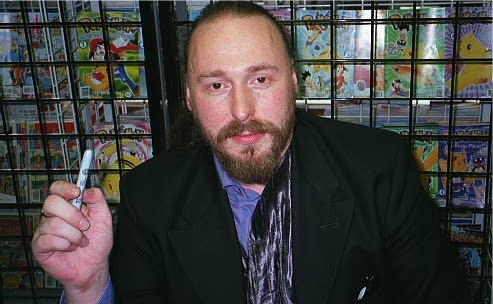
I apparently started writing before Warren Ellis did. The bastard's only one year older than me, and his bibliography warrants its own Wikipedia page, whereas I have one (1) published short story.
Yes, yes, I know, I was busy getting a Ph.D. in Artificial Intelligence while Warren Ellis was pulling his fingernails out trying to climb the walls of the unholy well that is Marvel Comics. I don't care. I see this as just another sign that his insane writing skills are a result of a deal with Cthulhu or the Devil.
I mean to track this walking abomination down, pin him to the wall, and get him to confess what deal he made, with whom, and whether it's still open. I mean, my soul is not for sale, but we're just talking some temp contract work for tentacular star-spawn in exchange for the preternatural ability to sway the minds of men with the written word, hey, maybe we can work something out.
-the Centaur
P.S. Actually, Mr. Ellis, I have no intention of tracking you down. First off, as a Christian I can't do any soultrading; second, I'm afraid if I actually met you it would be too much like Death meeting Alan Moore.
Labels: Dragon Writers
Comments:
Friday, September 11, 2009
Saga of the Nameless One
Comments:
Saturday, September 05, 2009
Test Post
Labels: Webworks
Comments:
Blogging from the Convention Floor

Ah, Dragon*Con: that magic time in September when 50,000 of my closest friends get together to transform four hotels in Atlanta into a gateway to another world.
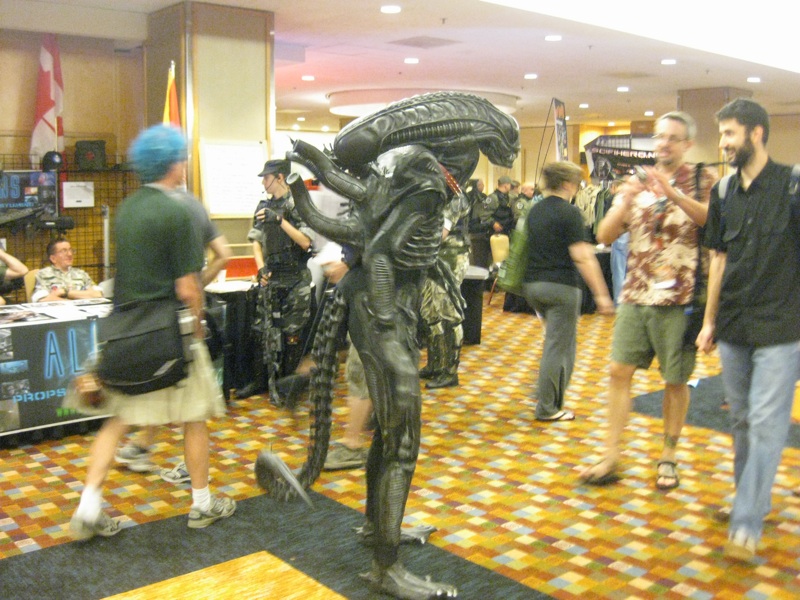
Dragon*Con has some of the best costumes you'll see this side of an Anime convention - much better than what you'll find at the much larger San Diego Comicon. Practically everyone is dressed up and some of them are amazing.
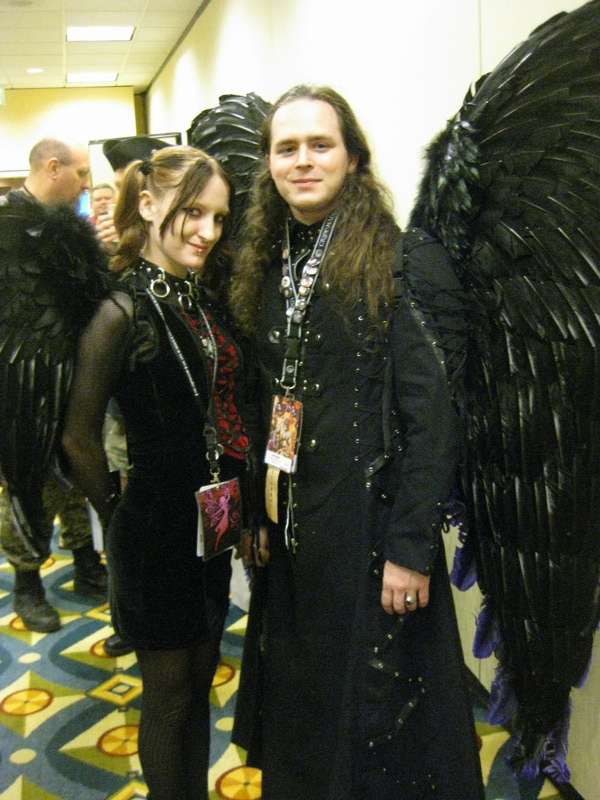
Another real draw is the fantastic variety of panels. There are literally dozens of tracks at Dragon*Con and programming goes on until 11:30 pm or later - and there are often social events until 2 and 3 in the morning.
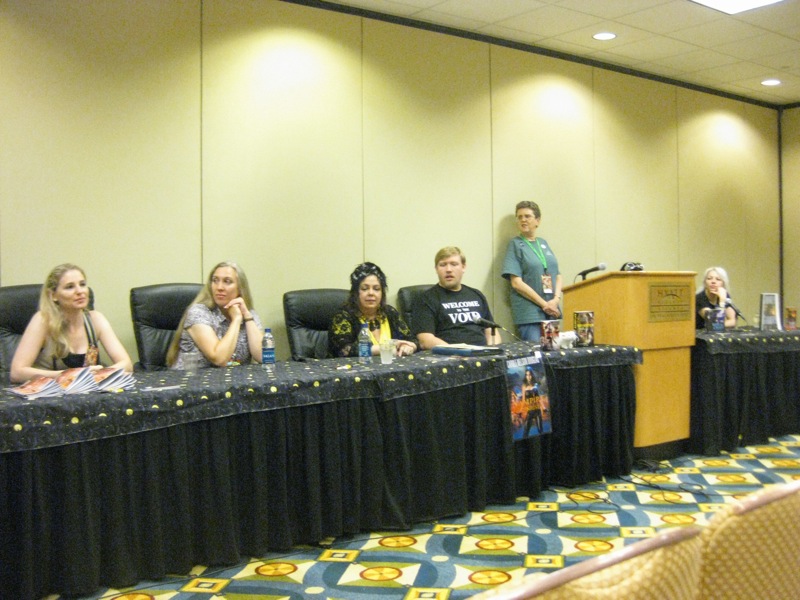
After the panels it's fun to just peoplewatch; you can do it for hours.
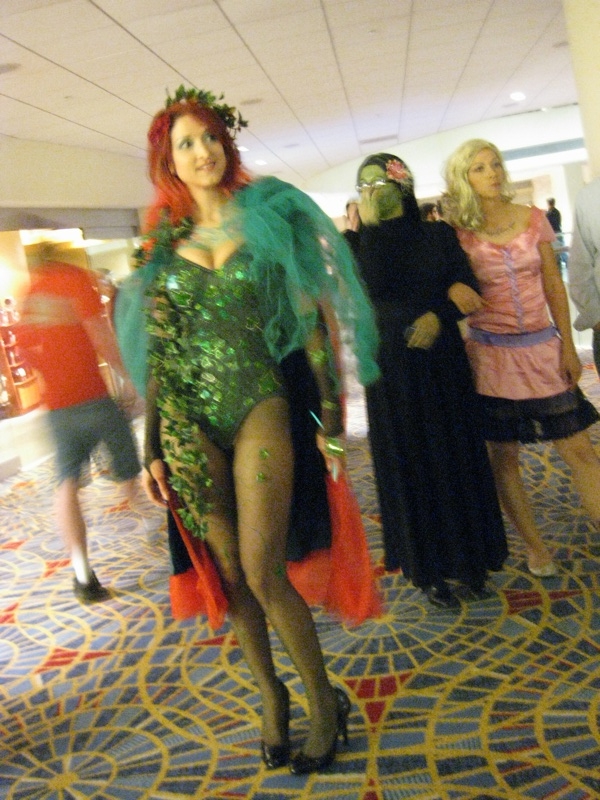
Women dressed up get quite a bit of attention - though sometimes, as in this case, they seem more surprised to have people taking their picture than you'd expect for all the effort they've put into their costumes.

Another piece of the fun is the sheer variety of fans. You see of course people pulling off Cylons ... somewhat less impressive with the helmets off...

You see costumes that mean something only to the viewer, as in this Dakota Frost lookalike...
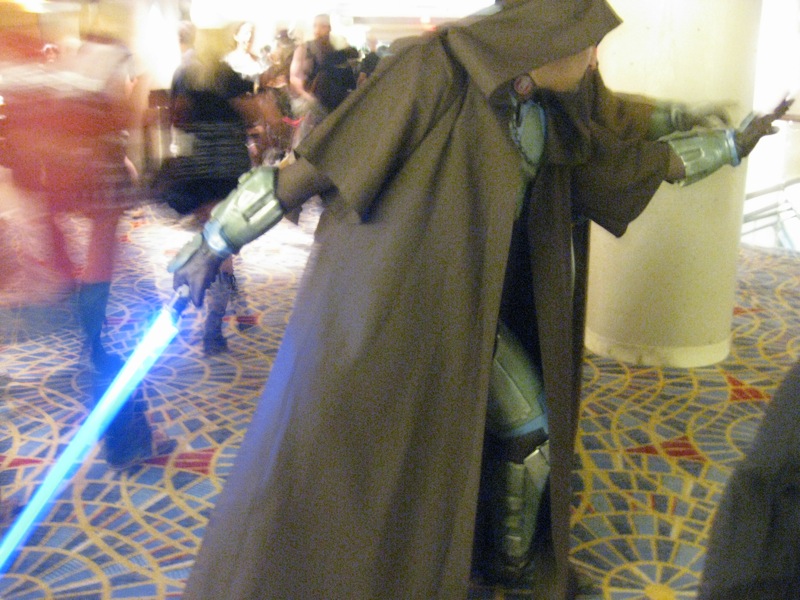
The ubiquitous Jedi, in this case posing for a photo taken by a Sith ...
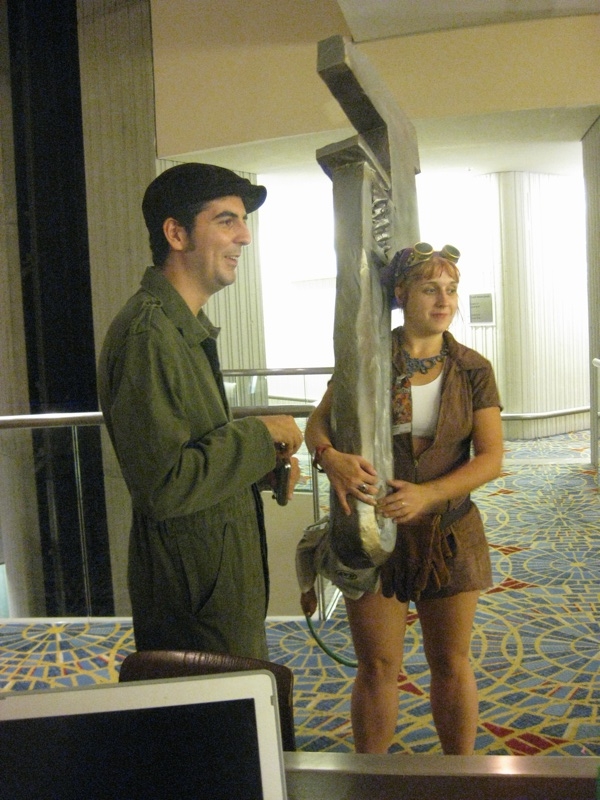
... and then finally sheer randomness by simply creative people.
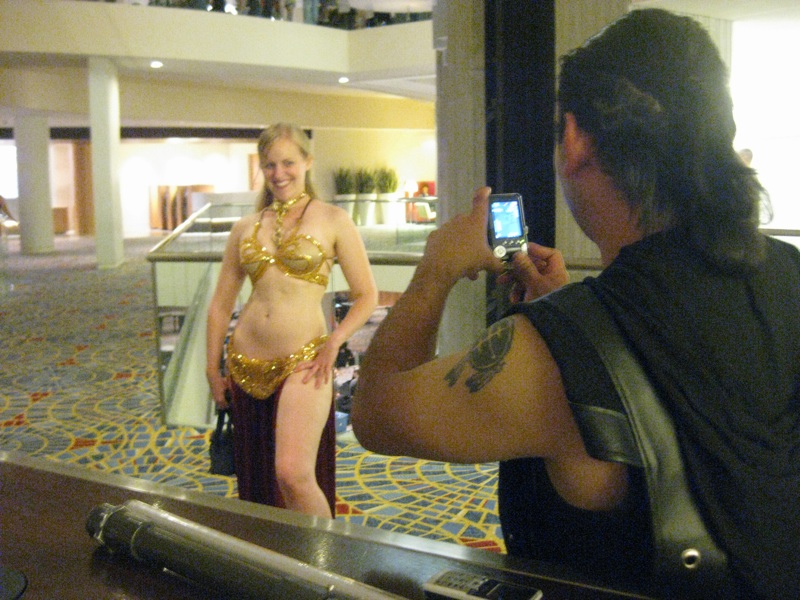
Fans love taking pictures of fans - it was quite interesting sitting with a Sith shutterbug, watching him take pictures of passing Poison Ivys and Slave Leias.

But then some people wanted to take pictures of him ... and then, bizarrely, two women wanted to have their pictures taken fellating his lightsabers. Utterly weird, and a great source of amusement to us and the other people at our table.

But ultimately that's the fun of Dragon*Con: not just seeing Jedi taking pictures of Sith, but running into old friends dressed as Jedi taking pictures of old friends dressed as Sith. Because in the end its the friendships that make Dragon*Con more than just a fan playground or a party: it's a family.

From the Dragon*Con Convention floor(1), this is your Centaur reporting. Good night, and good luck.
-the Centaur
(1) Technically, sent from my hotel room because connectivity on the con floor was too poor.
Labels: Dakota Frost, Dragon Writers, Sith Park
Comments:
Friday, September 04, 2009
An Odd Sense of Familiarity
So I'm back in Atlanta for a few days to visit friends and go see my mother ... oh, come off it, I'm here for Dragon*Con. But before that started, I had a whole day to recharge my Atlanta batteries - yes, visiting with several friends and hitting old haunts, but also seeing places that appear in the Dakota Frost series like the Flying Biscuit:

But I had a few chunks of downtime and a lot of work to do, so I dropped by Georgia Tech, browsed the bookstore - I love visiting college bookstores and browsing the textbooks: I like to know what universities are recommending students should be learning - and then plopped myself down in the embedded Starbucks to answer some email and try to push things forward.
But I found myself facing an odd sense of familiarity on the Georgia Tech campus. Of course, I recognized the buildings I was seeing, and I didn't recognize anyone specific that I knew. But a lot of people looked very ... familiar. Not the students: the professors and researchers and general population of people milling around at Georgia Tech.

I lived in Atlanta for 18 years; fourteen of those were spent on the Georgia Tech campus and since then I've visited the campus regularly to see friends or browse the bookstore. So it's possible that many of those familiar people are people I've seen, but don't remember.
Or it's possible that the culture of Georgia Tech - the clothes, the styles, the mannerisms - is something that newcomers pick up by osmosis, so even if I hadn't seen them before they've become like the people who I was formerly familiar with. And that's what made the sense of familiarity so odd: it was sufficiently vague I couldn't really tell the cause.

Interesting ... I wonder what I would look like if I had spent 18 years somewhere else.
-the Centaur
Labels: We Call It Living



 By day, Anthony Francis makes computers smarter; by night he writes science fiction and draws comic books. He lives in San Jose with his wife and cats but his heart will always belong in Atlanta.
By day, Anthony Francis makes computers smarter; by night he writes science fiction and draws comic books. He lives in San Jose with his wife and cats but his heart will always belong in Atlanta.
Comments: